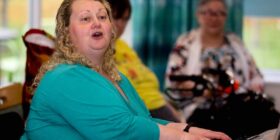Revised coronavirus rules for Wales unveiled – go out with a reasonable excuse but “you can’t remain outside to do other things”

The stay-at-home regulations are being revised in Wales to continue to prevent the spread of coronavirus.
The Welsh Government is changing the core requirement for people not to leave the place where they live, to a requirement not to leave or remain away from that place.
Wednesday saw a similar strengthening of the law in England, with Wales having its own versions, however the exact regulations for Wales are not public as of yet.
Welsh Government say the changes will help clarify that people who leave their home with a reasonable excuse – such as going out to shop for food, for healthcare or for work – cannot remain outside to do other things. This appears to close a loophole where someone could leave home with a reasonable excuse, however then proceed to do other things.
There are some new arrangements that allow people with particular health conditions or disabilities to leave home to exercise more than once a day. This will help families with children with learning disabilities and autism in particular.
The changes come as First Minister Mark Drakeford will today announce a new framework and seven key questions to help lead Wales out of the pandemic. Welsh Government say this will help determine when the right time comes for the stay-at-home restrictions to be eased.
Announcing today’s changes to the regulations, which follow the first statutory three-week review of the law, the First Minister said:
“The restrictions are staying in place, which mean you must stay at home to save lives and protect the NHS.
“Over the last few months, we have taken unprecedented steps to protect everyone, but particularly those most at risk from serious illness. This approach has helped the NHS prepare and cope with coronavirus and it has also helped to save many lives.
“The changes we are introducing supplement the rules already in force but they respond to some challenges being faced in parts of the country and by families throughout Wales.
“Our message has not changed – anyone can get coronavirus, anyone can spread it. So please, stay home, protect the NHS, and save lives.”
Other changes, that will come into force at 00:01 on Saturday, include:
- Applying the 2m physical distancing duty on premises used for “click and collect” style services – this duty is already in place for other workplaces, which remain open;
- Widening the definition of vulnerable person to include other specific groups or conditions where people could benefit from assistance and to whom providing supplies is a reasonable excuse for another person to leave home (for example, people with dementia);
- Extending the physical distancing duty to cafés accessible by the public in hospitals, and those responsible for canteens in schools, prisons and for use by the armed forces, to ensure all reasonable measures are put in place.
The Welsh Government has also asked the four police forces in Wales to provide further advice about whether existing provisions intended to prevent people from travelling to second homes in Wales need to be further strengthened.
As a reminder, the below is the current definition of ‘reasonable’ excuses to go out, with the new strengthened rules set to be published today…
Restrictions on movement and gatherings during the emergency period
8.—(1) During the emergency period, no person may leave the place where they are living without reasonable excuse.
(2) For the purposes of paragraph (1), a reasonable excuse includes the need—
(a)to obtain from any business listed in Part 4 of Schedule 1 —
(i)basic necessities, including food and medical supplies for those in the same household (including animals in the household) or for vulnerable persons;
(ii)supplies (including money) for the essential upkeep, maintenance and functioning of the household, or the household of a vulnerable person;
(b)to take exercise, no more than once a day, either alone or with other members of the household;
(c)to seek medical assistance, including accessing any of the services referred to in paragraph 42 of Schedule 1 or accessing veterinary services;
(d)to provide care or assistance, including relevant personal care within the meaning of paragraph 7(3B) of Schedule 4 to the Safeguarding of Vulnerable Groups Act 2006 F1, to a vulnerable person, or to provide emergency assistance;
(e)to donate blood;
(f)to travel for the purposes of work or to provide voluntary or charitable services, where it is not reasonably practicable for that person to work, or to provide those services, from the place where they are living;
(g)to attend a funeral—
[F2(i)as a person responsible for arranging the funeral,
(ii)if invited by a person responsible for arranging the funeral, or
(iii)as the carer of a person attending.]
(h)to meet a legal obligation, including attending court or satisfying bail conditions, or to participate in legal proceedings;
(i)to access critical public services, including—
(i)childcare or educational facilities (where these are still available to the person’s child);
(ii)social services;
(iii)services provided by the Department of Work and Pensions;
(iv)services provided to victims (such as victims of crime or domestic violence);
(j)in relation to children who do not live in the same household as their parents, or one of their parents, to continue existing arrangements for access to, and contact between, parents and children, and for the purposes of this paragraph, “parent” includes a person who is not a parent of the child, but who has parental responsibility for, or who has care of, the child;
(k)in the case of a minister of religion or worship leader, to go to their place of worship;
(l)to move house where necessary;
(m)to avoid injury or illness or to escape a risk of harm.
(3) For the purposes of paragraph (1), the place where a person lives includes the premises where they live together with any garden, yard, passage, stair, garage, outhouse or other appurtenance of such premises.
(4) Paragraph (1) does not apply to any person who is homeless.
(5) During the emergency period, no person may participate in a gathering in a public place of more than two people except—
(a)where all the persons in the gathering are members of the same household,
(b)where the gathering is essential for work purposes,
(c)to attend a funeral, or
(d)where necessary—
(i)to facilitate a house move,
(ii)to provide care or assistance to a vulnerable person, including relevant personal care within the meaning of paragraph 7(3B) of Schedule 4 to the Safeguarding of Vulnerable Groups Act 2006,
(iii)to provide emergency assistance, or
(iv)to participate in legal proceedings, or fulfil a legal obligation.
Spotted something? Got a story? Email [email protected]













